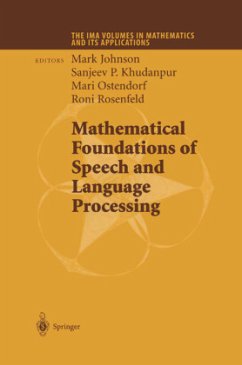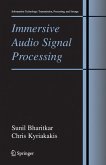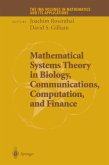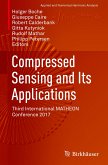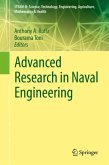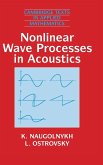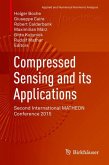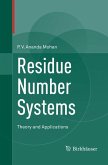Speech and language technologies continue to grow in importance as they are used to create natural and efficient interfaces between people and machines, and to automatically transcribe, extract, analyze, and route information from high-volume streams of spoken and written information.
The workshops on Mathematical Foundations of Speech Processing and Natural Language Modeling were held in the Fall of 2000 at the University of Minnesota's NSF-sponsored Institute for Mathematics and Its Applications, as part of a "Mathematics in Multimedia" year-long program. Each workshop brought together researchers in the respective technologies on the one hand, and mathematicians and statisticians on the other hand, for an intensive week of cross-fertilization.
There is a long history of benefit from introducing mathematical techniques and ideas to speech and language technologies. Examples include the source-channel paradigm, hidden Markov models, decision trees, exponential models and formal languages theory. It is likely that new mathematical techniques, or novel applications of existing techniques, will once again prove pivotal for moving the field forward.
This volume consists of original contributions presented by participants during the two workshops. Topics include language modeling, prosody, acoustic-phonetic modeling, and statistical methodology.
Hinweis: Dieser Artikel kann nur an eine deutsche Lieferadresse ausgeliefert werden.
The workshops on Mathematical Foundations of Speech Processing and Natural Language Modeling were held in the Fall of 2000 at the University of Minnesota's NSF-sponsored Institute for Mathematics and Its Applications, as part of a "Mathematics in Multimedia" year-long program. Each workshop brought together researchers in the respective technologies on the one hand, and mathematicians and statisticians on the other hand, for an intensive week of cross-fertilization.
There is a long history of benefit from introducing mathematical techniques and ideas to speech and language technologies. Examples include the source-channel paradigm, hidden Markov models, decision trees, exponential models and formal languages theory. It is likely that new mathematical techniques, or novel applications of existing techniques, will once again prove pivotal for moving the field forward.
This volume consists of original contributions presented by participants during the two workshops. Topics include language modeling, prosody, acoustic-phonetic modeling, and statistical methodology.
Hinweis: Dieser Artikel kann nur an eine deutsche Lieferadresse ausgeliefert werden.
From the reviews: "The topics covered are mostly related to acoustic and language modeling for automatic speech recognition (ASR). ... I found the book very interesting. ... I would recommend it only to readers who are already familiar with statistical methods for language processing. I think that Mathematical Foundations of Speech and Language Processing is, nevertheless, a good reference about recent trends in the fields of ASR and language processing, which are indeed very relevant to current research in MT." (M. Federico, Machine Translation, Vol. 20, 2006)

